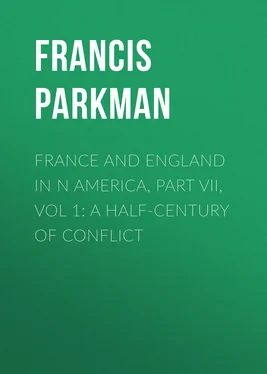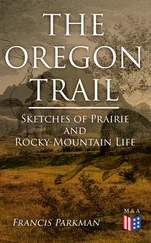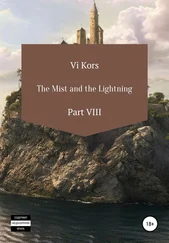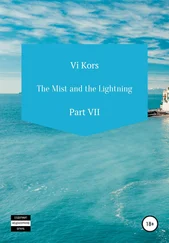Francis Parkman - France and England in N America, Part VII, Vol 1 - A Half-Century of Conflict
Здесь есть возможность читать онлайн «Francis Parkman - France and England in N America, Part VII, Vol 1 - A Half-Century of Conflict» — ознакомительный отрывок электронной книги совершенно бесплатно, а после прочтения отрывка купить полную версию. В некоторых случаях можно слушать аудио, скачать через торрент в формате fb2 и присутствует краткое содержание. Жанр: foreign_prose, История, foreign_edu, foreign_antique, на английском языке. Описание произведения, (предисловие) а так же отзывы посетителей доступны на портале библиотеки ЛибКат.
- Название:France and England in N America, Part VII, Vol 1: A Half-Century of Conflict
- Автор:
- Жанр:
- Год:неизвестен
- ISBN:нет данных
- Рейтинг книги:3 / 5. Голосов: 1
-
Избранное:Добавить в избранное
- Отзывы:
-
Ваша оценка:
- 60
- 1
- 2
- 3
- 4
- 5
France and England in N America, Part VII, Vol 1: A Half-Century of Conflict: краткое содержание, описание и аннотация
Предлагаем к чтению аннотацию, описание, краткое содержание или предисловие (зависит от того, что написал сам автор книги «France and England in N America, Part VII, Vol 1: A Half-Century of Conflict»). Если вы не нашли необходимую информацию о книге — напишите в комментариях, мы постараемся отыскать её.
France and England in N America, Part VII, Vol 1: A Half-Century of Conflict — читать онлайн ознакомительный отрывок
Ниже представлен текст книги, разбитый по страницам. Система сохранения места последней прочитанной страницы, позволяет с удобством читать онлайн бесплатно книгу «France and England in N America, Part VII, Vol 1: A Half-Century of Conflict», без необходимости каждый раз заново искать на чём Вы остановились. Поставьте закладку, и сможете в любой момент перейти на страницу, на которой закончили чтение.
Интервал:
Закладка:
In spite of these efforts to maintain public worship, they were far from being a religious community; nor were they a peaceful one. Gossip and scandal ran riot; social jealousies abounded; and under what seemed entire democratic equality, the lazy, drunken, and shiftless envied the industrious and thrifty. Wells was infested, moreover, by several "frightfully turbulent women," as the chronicle styles them, from whose rabid tongues the minister himself did not always escape; and once, in its earlier days, the town had been indicted for not providing a ducking-stool to correct these breeders of discord.
Judicial officers were sometimes informally chosen by popular vote, and sometimes appointed by the governor of Massachusetts from among the inhabitants. As they knew no law, they gave judgment according to their own ideas of justice, and their sentences were oftener wanting in wisdom than in severity. Until after 1700 the county courts met by beat of drum at some of the primitive inns or taverns with which the frontier abounded.
At Wells and other outlying and endangered hamlets life was still exceedingly rude. The log-cabins of the least thrifty were no better furnished than Indian wigwams. The house of Edmond Littlefield, reputed the richest man in Wells, consisted of two bedrooms and a kitchen, which last served a great variety of uses, and was supplied with a table, a pewter pot, a frying-pan, and a skillet; but no chairs, cups, saucers, knives, forks, or spoons. In each of the two bedrooms there was a bed, a blanket, and a chest. Another village notable—Ensign John Barrett—was better provided, being the possessor of two beds, two chests and a box, four pewter dishes, four earthen pots, two iron pots, seven trays, two buckets, some pieces of wooden-ware, a skillet, and a frying-pan. In the inventory of the patriarchal Francis Littlefield, who died in 1712, we find the exceptional items of one looking-glass, two old chairs, and two old books. Such of the family as had no bed slept on hay or straw, and no provision for the toilet is recorded. 46 46 The above particulars are drawn from the History of Wells and Kennebunk , by the late Edward E. Bourne, of Wells,—a work of admirable thoroughness, fidelity, and candor.
On the tenth of August, 1703, these rugged borderers were about their usual callings, unconscious of danger,—the women at their household work, the men in the fields or on the more distant salt-marshes. The wife of Thomas Wells had reached the time of her confinement, and her husband had gone for a nurse. Some miles east of Wells's cabin lived Stephen Harding,—hunter, blacksmith, and tavern-keeper, a sturdy, good-natured man, who loved the woods, and whose frequent hunting trips sometimes led him nearly to the White Mountains. Distant gunshots were heard from the westward, and his quick eye presently discovered Indians approaching, on which he told his frightened wife to go with their infant to a certain oak-tree beyond the creek while he waited to learn whether the strangers were friends or foes.
That morning several parties of Indians had stolen out of the dismal woods behind the houses and farms of Wells, and approached different dwellings of the far-extended settlement at about the same time. They entered the cabin of Thomas Wells, where his wife lay in the pains of childbirth, and murdered her and her two small children. At the same time they killed Joseph Sayer, a neighbor of Wells, with all his family.
Meanwhile Stephen Harding, having sent his wife and child to a safe distance, returned to his blacksmith's shop, and, seeing nobody, gave a defiant whoop; on which four Indians sprang at him from the bushes. He escaped through a back-door of the shop, eluded his pursuers, and found his wife and child in a cornfield, where the woman had fainted with fright. They spent the night in the woods, and on the next day, after a circuit of nine miles, reached the palisaded house of Joseph Storer.
They found the inmates in distress and agitation. Storer's daughter Mary, a girl of eighteen, was missing. The Indians had caught her, and afterwards carried her prisoner to Canada. Samuel Hill and his family were captured, and the younger children butchered. But it is useless to record the names and fate of the sufferers. Thirty-nine in all, chiefly women and children, were killed or carried off, and then the Indians disappeared as quickly and silently as they had come, leaving many of the houses in flames.
This raid upon Wells was only part of a combined attack on all the settlements from that place to Casco. Those eastward of Wells had been, as we have seen, abandoned in the last war, excepting the forts and fortified houses; but the inhabitants, reassured, no doubt, by the Treaty of Casco, had begun to return. On this same day, the tenth of August, they were startled from their security. A band of Indians mixed with Frenchmen fell upon the settlements about the stone fort near the Falls of the Saco, killed eleven persons, captured twenty-four, and vainly attacked the fort itself. Others surprised the settlers at a place called Spurwink, and killed or captured twenty-two. Others, again, destroyed the huts of the fishermen at Cape Porpoise, and attacked the fortified house at Winter Harbor, the inmates of which, after a brave resistance, were forced to capitulate. The settlers at Scarborough were also in a fortified house, where they made a long and obstinate defence till help at last arrived. Nine families were settled at Purpooduck Point, near the present city of Portland. They had no place of refuge, and the men being, no doubt, fishermen, were all absent, when the Indians burst into the hamlet, butchered twenty-five women and children, and carried off eight.
The fort at Casco, or Falmouth, was held by Major March, with thirty-six men. He had no thought of danger, when three well-known chiefs from Norridgewock appeared with a white flag, and asked for an interview. As they seemed to be alone and unarmed, he went to meet them, followed by two or three soldiers and accompanied by two old men named Phippeny and Kent, inhabitants of the place. They had hardly reached the spot when the three chiefs drew hatchets from under a kind of mantle which they wore and sprang upon them, while other Indians, ambushed near by, leaped up and joined in the attack. The two old men were killed at once; but March, who was noted for strength and agility, wrenched a hatchet from one of his assailants, and kept them all at bay till Sergeant Hook came to his aid with a file of men and drove them off.
They soon reappeared, burned the deserted cabins in the neighborhood, and beset the garrison in numbers that continually increased, till in a few days the entire force that had been busied in ravaging the scattered settlements was gathered around the place. It consisted of about five hundred Indians of several tribes, and a few Frenchmen under an officer named Beaubassin. Being elated with past successes, they laid siege to the fort, sheltering themselves under a steep bank by the water-side and burrowing their way towards the rampart. March could not dislodge them, and they continued their approaches till the third day, when Captain Southack, with the Massachusetts armed vessel known as the "Province Galley," sailed into the harbor, recaptured three small vessels that the Indians had taken along the coast, and destroyed a great number of their canoes, on which they gave up their enterprise and disappeared. 47 47 On these attacks on the frontier of Maine, Penhallow, who well knew the country and the people, is the best authority. Niles, in his Indian and French Wars , copies him without acknowledgment, but not without blunders. As regards the attack on Wells, what particulars we have are mainly due to the research of the indefatigable Bourne. Compare Belknap, i. 330; Folsom, History of Saco and Biddeford , 198; Coll. Maine Hist. Soc. , iii. 140, 348; Williamson, History of Maine , ii. 42. Beaubassin is called "Bobasser" in most of the English accounts.
Интервал:
Закладка:
Похожие книги на «France and England in N America, Part VII, Vol 1: A Half-Century of Conflict»
Представляем Вашему вниманию похожие книги на «France and England in N America, Part VII, Vol 1: A Half-Century of Conflict» списком для выбора. Мы отобрали схожую по названию и смыслу литературу в надежде предоставить читателям больше вариантов отыскать новые, интересные, ещё непрочитанные произведения.
Обсуждение, отзывы о книге «France and England in N America, Part VII, Vol 1: A Half-Century of Conflict» и просто собственные мнения читателей. Оставьте ваши комментарии, напишите, что Вы думаете о произведении, его смысле или главных героях. Укажите что конкретно понравилось, а что нет, и почему Вы так считаете.












